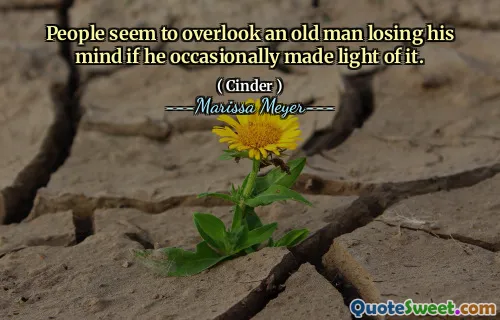
People seem to overlook an old man losing his mind if he occasionally made light of it.
This quote highlights a poignant aspect of human perception and societal attitudes towards aging and mental health. Often, society tends to dismiss or ignore the struggles of the elderly, especially when those struggles come with a touch of humor or lightheartedness. The phrase suggests that an old man experiencing cognitive decline may not garner the attention or empathy he deserves, particularly if he jokes or makes light of his own condition. This reflects a deeper societal tendency to normalize or trivialize issues associated with aging, which can lead to neglect or a lack of support.
It prompts us to consider how compassion and awareness are sometimes overshadowed by the need to maintain appearances or societal comfort. When someone, especially an elder, tries to cope by making jokes or adopting a humorous facade, their suffering can be dismissed as part of their personality rather than recognized as a genuine concern requiring understanding. This phenomenon is not limited to aging but extends broadly into various areas of mental health and emotional well-being.
In a broader context, the quote urges introspection about how we treat those who suffer silently or in unconventional ways. Are we truly acknowledging their pain, or are we allowing societal norms of propriety and decency to prevent us from seeing their struggles? It reminds us that empathy and sincere attention are vital and that we should be cautious about dismissing someone’s plight simply because they choose to approach it with humor.
It's a reminder that beneath a facade of lightheartedness, there could be unseen depths of pain that deserve recognition and kindness. By understanding this, we can foster a more compassionate society where individuals feel safe to express their struggles without fear of being overlooked or dismissed.





